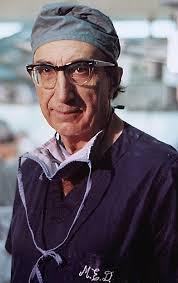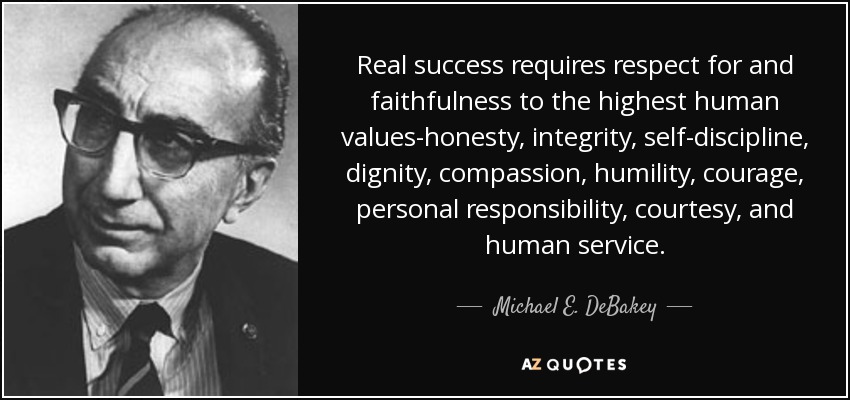Putting together a puzzle of life, if you start with a piece of an enormous drive to excellence, add a piece of self-discipline, follow it with another piece of resilience, interpose these with a part of impeccable work habits, find a piece of attention to details and intolerance of error, border them with many pieces of intelligence, and finally dress it all with an oversized pair of glasses, you would realize the final image is that of Dr. Michael DeBakey.

How do you get to be better than the best? How do you be so universally good that during the Cold War the Russians invited you to supervise their top doctors operating on their leader? How good you have to be when the President of your country seeks your advice, despite including you on his official Enemy list?
I’ll tell you how.
In your twenties, you designed a pump, which has been used ever since in hospitals throughout the world in countless open-heart procedures. This device has your name embedded in it, so the future generations won’t forget your contribution. Then if they ask you what inspired you to come up with such a brilliant, yet simple design––serendipity or providence, you answer:
“The role of Providence in human endeavor is speculative, but I would like to think that in a personal case it is purposeful”,
You invent a myriad of surgical instruments, so commonly used, that, if a surgeon wants to use it––he just tells his scrub nurse your name.
Then, with a prophetic stroke of genius, in the height of a lustrous career, you design the operation for a deadly condition, which, in your nineties, almost kills you. After a drama, fit for a Hollywood epic, the surgery is performed, and you can still go back to work to your room located on the top floor of the hospital, the hospital you founded, developed, and made famous in all the world’s corners, the hospital which in the end saved your life. The Methodist Hospital.
And talking about the drama.
On New Year’s Eve 2005, a ripping pain between Dr. DeBakey’s shoulder blades interrupted his preparation for the next year’s lecture. He suspected the diagnosis since throughout his entire life, medical checkups didn’t show a smidgen of the heart disease. He was 97 years old, had an extraordinary and fulfilling life, and just didn’t want to see a doctor. After 3 days, however, probably under a pressure from the family, a CT of the chest was done and confirmed the diagnosis of aortic dissection. According to the classification DeBakey himself designed, he was blessed with the worst type, type 2. If you were looking for a true thoracic emergency––here it was. Despite being painfully aware of the gravity of the problem, for the next 5 weeks, he adamantly refused to be admitted to the hospital. Then, after DeBakey slipped into a coma, the family rushed him to the hospital. Friday afternoon, the emergency Ethics Committee meeting ended with a decision to offer the surgery to their patriarch. But the chief anesthesiologist, and the rest of the hospital’s anesthesia staff for that matter, refused to put him to sleep, telling of the conversation he had with Dr. DeBakey not wanting to have any extraordinary efforts on his behalf in a case of emergency. The family found another anesthesiologist willing to do surgery, a doctor who worked in a different hospital. But he didn’t have the formal rights to practice at Methodists. Another emergency meeting and the privileges were granted.
The operation lasted seven hours. The surgeon, who was mentored by DeBakey, did the type of procedure, which DeBakey himself described 50 years ago. They cooled his body and repaired his torn aorta with a Dacron graft, the same prosthetic material DeBakey developed more than 50 years ago. And he finished the long vascular procedure with tracheostomy and gastrostomy. After 3 months of treatment, Dr. Michael DeBakey, who was saved by the operation he devised 50 years prior, was discharged home. He lived another 2 years, what for a person approaching a century mark, seemed like another century.
The bill for the procedure approached one million dollars, which obviously was written off.
We could discuss, obviously, the appropriateness of doing surgery on this 97-year-old patient, a feat which was as demanding for him as it was for the operating crew. But, after all was said and done, the patient himself was grateful for every effort to get him through this ordeal. He had been granted 2 more years of an extraordinary life.

Asked about the other special ingredients which helped him climb the heights never reached before, DeBakey mentioned music.
“Studying music encourages self-discipline and diligence, traits that carry over into intellectual pursuits and that lead to effective study and work habits. An association of music and math has, in fact, long been noted. Creating and performing music promotes self-expression and provides self-gratification while giving pleasure to others. In medicine, increasing published reports demonstrate that music has a healing effect on patients. For all these reasons, it deserves strong support in our educational system, along with the other arts, the sciences, and athletics.”
And what infuriated him the most?
“I have little tolerance for incompetence, sloppy thinking, and laziness.”
Many of his residents could second that.
But I omitted the most celebrated part of his life––his feud with Dr. Denton Cooley.
More about it in the next post.


